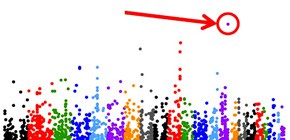
Discovery of gene responsible for cognitive dysfunction in schizophrenia patients
Under the leadership of HASHIMOTO Ryota , Associate Professor, United Graduate School of Child Development, Osaka University , and IWATA Nakao , Professor, Fujita Health University , a group of researchers discovered that, in gene analyses associated with cognitive dysfunction in schizophrenia patients, Single Nucleotide Polymorphism (SNP) of the DEGS2 gene, the metabolic enzyme of complex lipid, was related to cognitive function decline in schizophrenia. Research into the decline in cognitive function in schizophrenia patients by Prof. Hashimoto and a genome wide association study (GWAS) by Prof. Iwata led to this group's discovery. Recently, gene analysis of neuropsychiatric disorders has been making progress. The identification of new factors by this group is an outstanding achievement in psychiatric medicine. This group's discovery will aid the development of therapeutics for cognitive function decline.
Abstract
Substantial evidence suggests that many patients with schizophrenia experience a decline in intellectual functioning. Approximately 50% of patients with schizophrenia show cognitive deterioration, with an IQ decline of 10 points from the premorbid IQ; cognitive decline in schizophrenia remains stable. As there is considerable inter-individual variation in the degree of decline, it is conceivable that genetic influences play a role in determining the severity of cognitive decline in schizophrenia. We conducted a genome-wide association study (GWAS) of cognitive decline in 166 patients with schizophrenia (mean estimated premorbid IQ (JART: Japanese Adult Reading Test): 101.2±10.0, full scale IQ (WAIS): 85.1±16.8 and difference score (subtraction of JART from full scale IQ): -16.1±13.1). We performed a multiple linear regression analysis to compare the difference score in major allele homozygous genotypes with that in minor allele carriers, with gender and education years as covariates, using PLINK 1.07 software. Detailed information regarding the subjects and methods is provided in the “Supplementary Methods and Data” and in Supplementary Table1. Although we did not observe any association at a widely used benchmark for genome-wide significance (p=5x10-8), the strongest association was observed at rs7157599 on chromosome 14, a missense polymorphism (Asn8Ser) in the DEGS2 gene (p=5.4x10-7). The most significant 10 markers and the top 200 markers are shown. Rs17069667 is an intronic SNP in the CSMD1 gene, which has been identified as a new risk gene for schizophrenia by a recent, large-scale GWAS. Associations between the 10 SNPs and the estimated premorbid IQ were not observed (all p>0.3); however, associations between the 10 SNPs and full scale IQ were observed in all of the SNPs. Analysis using an additive model and analysis with age, gender, illness duration and antipsychotic dose as covariates also showed slightly reduced but remained significant association. Our results suggest associations at the p<1x10-5 level between difference score in schizophrenia and four genes, one of which has been identified as a new locus for schizophrenia (CSMD1). Replication analysis using the CBDB/NIMH (Clinical Brain Disorders Branch, National Institute of Mental Health) sample showed a directionally consistent, trend association of genotype for a proxy of the top SNP, rs7157599 (rs3783332: r2=0.63, one tailed p=0.03). Although the study should be replicated with a larger sample size, our results show that the measurement of cognitive decline in schizophrenia as a quantitative phenotype (in conjunction with GWAS) could be a gene discovery tool. We should note, however, that we cannot rule out an interaction of our gene variants with the affect of antipsychotic drugs on cognition.
Figure1

Figure 2

Figure 3
To learn more about this research, please read the full research report entitled " Genome-Wide Association Study of Cognitive Decline in Schizophrenia " at this page of the American Journal of Psychiatry website.
Related link :

